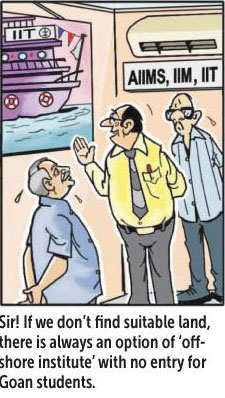India has over 4.3 crore court cases pending at all levels from Supreme Court to District Courts. As per Niti Ayog report, it is expected to take more than 324 years to clear the backlog of cases. Goa has over 57,000 cases pending.
The new tech savvy Chief Justice with age and tenure on his- side, with supportive proactive dynamic young law minister and technology focussed solution oriented Prime Minister have rekindled the hopes that some far-reaching steps may be taken to clear the backlog of cases using Artificial Intelligence Technology.
Income Tax Department was earlier perceived as the most corrupt department in India. This is now a history. There has been a 360-degree change which has been made possible with the latest technological platform resulting in zero pending cases. Same is the case with GST with the integration of thirteen tax laws which reduced number of appeals significantly. Recent Jan Vishwas Act which decriminalises 183 offences across 42 legislations will reduce pending cases further.
Recently Argentina has developed a Chatbot GPT (Generative Pre-trained Transformer) based software system called Prometea which can provide readymade draft of court judgements in seconds based on proven facts, applicable law, precedents, judgements cited by opposing parties and also on judgements not in the knowledge of lawyers and presiding judges after giving due weightage. The Apex Court is proactive and should align with this technology to reduce pendency in speedy way.
In the meantime, Government of India and our legal justice system should take following steps:
• Biggest Litigants: State and Central Governments are biggest litigants and contribute to 46% pending cases being unmindful of costs. Sometimes to harass opponents, cases are simultaneously filed in different courts in different states on same issues. To avoid this, a negative list of situations where government and its agencies are barred from going to court should be notified.
Central Board of Direct Taxes has stalled tendency of filing appeals by issuing mandatory directions by fixing monetary limits of tax demands for filing appeals in different courts.
•
Take Justice to the doorstep: Income tax was introduced in Goa from 1963. There was controversy about correct status of Goan assesses, i.e. whether BOI or individual due to conflicting court judgements. By the time this was settled in the year 1994, there was backlog of huge cases. However one dynamic, upright, honest, non-corrupt IT officer named Gopal Aiyer held weekly camps in Taluka sales tax offices to clear pending assessment work and settled cases within few minutes . This brought pendency to almost zero during his short tenure. The same strategy can be adopted by judicial officers of lower courts to weed out cases of prisoners languishing in jails for petty offences by either giving warnings to first offenders or small punishments, to close the case.• Strict monitoring of adjournments: Time of the court is wasted with frequent unending adjournments, this should be strictly monitored by higher authorities with compulsory legal costs and penalty to opposite parties.
• Speeding up court orders through technology tools: Judges are still dictating orders to stenographers. Instead judges should be trained to dictate through voice modulation on laptops or through smart phones in a relaxed manner. Excellent software programmes are available with latest law, rules, notifications and court rulings. After entering basic data and other inputs and after citing judgements provided by parties, results are available to pass appropriate orders. Online hearings as happened in Covid times should be encouraged.
• Judicial vacancies: There is acute shortages of judges. Vacancies should be filled on war footing. There should be a special all India Judicial Cadre as in the case of IAS-IFS-IPS to have quality officers. Collegium conundrum should be resolved with urgency. Competent judicial officers should be given extensions till age 65 on contract basis.
• Our jails are overflowing with poor under-trial prisoners for petty offences who are unable to give surety for bails. Almost 76% fall in this category. Recently our President Droupadi Murmu expressed her anguish about such cases in presence of judicial heads including Chief Justice. This should be resolved on priority basis by setting them free or granting automatic bail as many of them do not have sureties to give.
• Bails: Supreme Court has often ruled that bails to accused should be norm and not exceptions. Still Session Courts shirk from this responsibility. This tendency should be put down with a stern hand by superior courts.
• Frivolous appeals to delay justice or to stall government projects or public interest litigations to gain publicity should be dealt with a heavy hand with exemplary penalties.
• Judgements without hearings: Option should be given to litigants to choose deciding of the case on merits based on facts and law without appearance for hearings. These cases should be given top priority in hearings as incentive.
• Apex Court should not waste time on deciding cases like height of “Dahi-Handi”, “Sabrimala entry”, how Army should deal with attackers, dead demonetisation and like. Suo moto SC should take initiative for Judicial Reforms and suggesting changes in law for speedy disposals.
I am a layman. These suggestions are made based on whatever I have read, observed and studied which may already be known to stakeholders.
